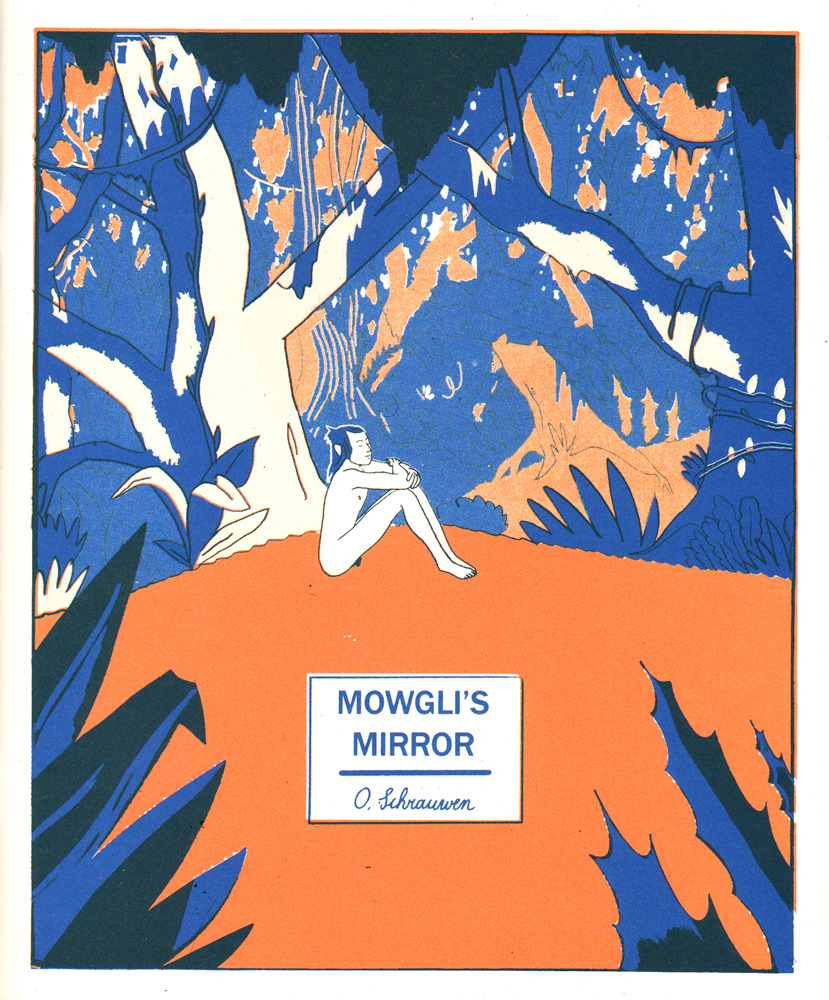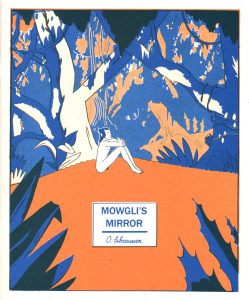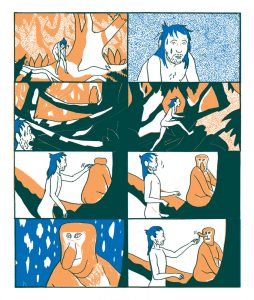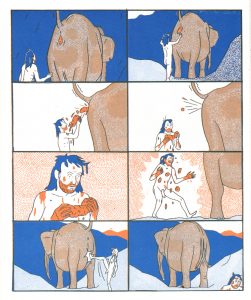One of the first books to be sent out as part of RetrofitComics 2015 subscription is Olivier Schrauwen’s Mowgli’s Mirror, a book previously published in both Spanish and French. Clocking in at 44 pages and at a BD-sized 10×12”, the book feels more substantial than previous Retrofit floppy comics, which have all been lovely in terms of durability and paper quality. In Mowgli’s Mirror, Schrauwen puts Rudyard Kipling’s famous character to use in a way that both feels very fresh, and rebuts Sinclair’s seminal work.
It’s important to mention that Schrauwen does some very interesting things with the book in terms of design and layout, the foremost being the use of mirrored panels across the center panel line of a standard 8 panel grid. Sometimes these panels are direct mirrors, but many times a character and a similar if not identical character will switch places within the mirroring effect. Orange and blue complementary colors heighten the sense of mirroredness.
Mowgli’s Mirror is a wordless comic; in some ways, wordless feels right for the tone of the book. It emphasizes a sense of feralness or otherness that Schrauwen seems to harness throughout the comic.
Kipling’s The Jungle Book was my second introduction to Mowgli and his animal friends, the first being the classic Disney animated film; it’s hard not to compare Mowgli’s Mirror to both pieces of fiction with all of their differences. From a storytelling perspective, Mowgli’s Mirror seems much more character driven and linear, resembling more the animated 1967 musical than the episodic stories of Kipling. That said, Mowgli’s Mirror does more directly identify with Kipling’s work in terms of tone and as something of its antithesis.
Disney’s The Jungle Book was a light-hearted romp and a mostly silly accounting of Mowgli’s move from the forest to the man-village. The contrast to Kipling’s work is sharp. Kipling’s The Jungle Book is much more uneasy work, a view of Indian culture from an imperialist’s perspective wherein Mowgli must choose between identities (and ultimately chooses the “right” identity). Mowgli’s Mirror rejects this imperialism as absurd as its namesake character staggers from mishap to mishap, showing his inability to accept things for what they are and accept the boundaries of life and other individuals.
Importantly in Mowgli’s Mirror, Mowgli appears as a sexual being, something unique to Schrauwen’s portrayal and something of a defining characteristic of the story. Mowgli is trying to find a mate and thinks he has found one in an orangutan; the orangutan later rebuffs his advances and flees when he tries to bring a wolf to meet her. There’s a leaf that Schrauwen hangs conspicuously over Mowgli’s genitals throughout the first half of the book; it seems that the loss of the leaf is the loss of innocence, and eventually the understanding that his mirror in the orangutan is false.
Mowgli’s journey in the rest of the book seems to represent his attempt to return to where he started, to retrieve his innocence and his mirror – but his own actions keep him from achieving his goals in the jungle. It is only at the end of the book that Mowgli understands that he can’t have what he once had. Only when Mowgli is battered and bruised by his constant failures can he find his true mirror. The progression of acceptance is fascinating, and with Schrauwen’s eye for color, detail, and a unique design, this is a book worth your time. Recommended.

Olivier Schrauwen is a cartoonist based in Berlin, Germany. His graphic novel Arsene Schrauwen has been celebrated as one of the best of
2014, and has been nominated for an LA Times Book Award and is shortlisted on the Slate Book Review’s Cartoonist Studio Prize.
Retrofit Comics retrofitcomics is a small comics publishing outfit that prints high-quality staple-bound independent comics. Check out their recently released books and purchase a 2015 subscription at their website.





